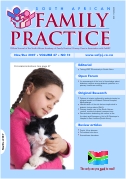An Identification of the Risk Factors Implicated in Diabetic Ketoacidosis (DKA)
Keywords:
diabetic ketoacidosis, type I diabetes mellitus, type II diabetes mellitus, risk factors, patient compliance
Abstract
Background: Despite improvements in therapy and disease monitoring, diabetic ketoacidosis (DKA) remains a potentially fatal consequence. This retrospective study was undertaken to establish and identify those risk factors that are responsible for the onset of DKA. Methods: The medical records of 77 patients from Addington Hospital, who satisfied the criteria for inclusion into the study of DKA, were reviewed (60 type 1 diabetes mellitus (DM) patients and 17 type 2 DM patients). Results: More juveniles were admitted for multiple DKA episodes (65%) than non-juveniles (35%). DKA occurred in 23% of newly diagnosed type 1 DM on first presentation. Infection was present in 40% of type 1 DM patients with single DKA episodes and in 45% of type 1 DM patients with multiple DKA episodes. A total of 23.2% of all admissions for single DKA involved non-compliance of medication usage and was implicated in 32% of multiple DKA episodes Family and/or school problems presented in 7% of single DKA episodes and 4% in multiple DKA episodes. In the present study, the overall mortality rate was 2.5% (n=2). Conclusion: This study showed that the most important risk factors implicated in DKA were infection, non-compliance and newly diagnosed diabetes, followed by family and/or school problems, low socio-economic status and omission of insulin.
Published
2007-11-14
Section
Original Research
By submitting manuscripts to SAFP, authors of original articles are assigning copyright to the South African Academy of Family Physicians. Copyright of review articles are assigned to the Publisher, Medpharm Publications (Pty) Ltd, unless otherwise specified. Authors may use their own work after publication without written permission, provided they acknowledge the original source. Individuals and academic institutions may freely copy and distribute articles published in SAFP for educational and research purposes without obtaining permission.

